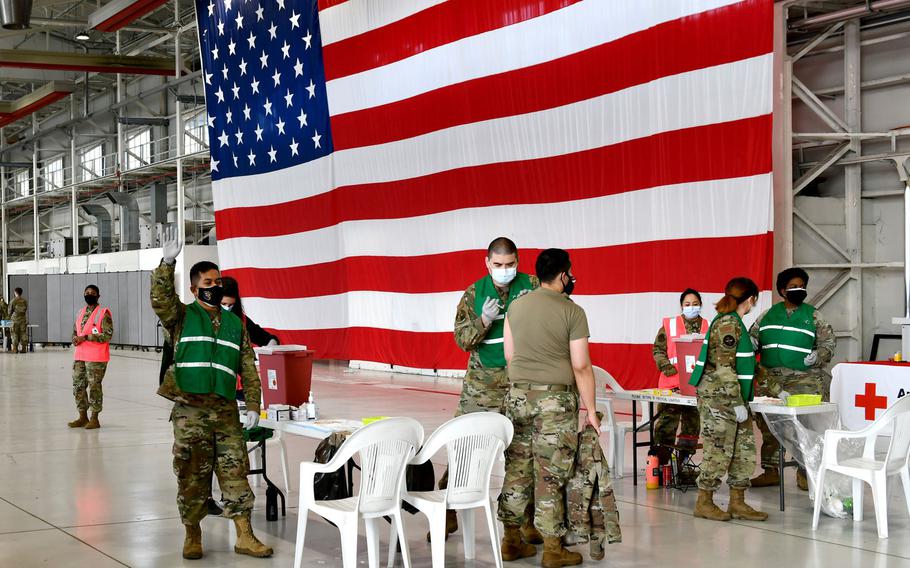
U.S. airmen assigned to the 31st Medical Group give COVID-19 vaccinations at Aviano Air Base, Italy, April 23, 2021. ( K. Tucker Owen/U.S. Air Force)
Stars and Stripes is making stories on the coronavirus pandemic available free of charge. See more staff and wire stories here. Sign up for our daily coronavirus newsletter here. Please support our journalism with a subscription.
AVIANO AIR BASE, Italy — Thousands of Europeans employed by the U.S. military could be vaccinated against COVID-19 on U.S. bases in the coming weeks, in a move that would better protect American military communities and help allies struggling to inoculate their citizens.
“We’re talking about people who will be interacting with the U.S. community,” said Lt. Cmdr. Russ Wolfkiel, a U.S. European Command spokesman. “These are definitely the kind of people you’d want to have vaccinated.”
But not all local nationals with military ID cards will be eligible to receive vaccinations, Wolfkiel said. Those directly employed by the U.S. and eligible dependents will be able to get them, while those working for third-party contractors will probably not be eligible, he said.
Hundreds of local nationals who work for the U.S. military in Europe, in fields that the U.S. Centers for Disease Control and Prevention say should be given priority for vaccination, have already had at least one shot.
European spouses of active-duty or retired service members may also have had at least one shot, Wolfkiel said, though that number isn’t tracked beyond the local level.
Commands must get approval from local governments and the process can get complicated, he said.
At Aviano, for instance, a last-minute bureaucratic hurdle meant some 540 of roughly 700 local nationals who thought they would be vaccinated Friday didn’t get the shots, the newspaper Messaggero Veneto reported.
Officials from the two unions representing Italians on base — Unione Italiana Lavoratori Turismo Commercio Servici and Confederazione Italiana Sindacati Lavorati — have asked the commissioner in charge of coordinating Italy’s vaccination campaign, Lt. Gen. Francesco Paolo Figliuolo, to intervene.
The unions did not respond to a request for comment, but in January they spoke in favor of Italian workers being vaccinated on U.S. bases, as long as they received the same guarantees as they would under the Italian health care system.
The number of Americans at Aviano who haven’t yet received a first shot has shrunk dramatically in recent weeks.
The base has administered at least one shot of the Moderna vaccine to 78% of its U.S. population and 55% have been fully vaccinated as of Monday, Aviano officials said. Roughly 6,000 Americans are eligible to receive the shot at Aviano.
In addition to hundreds of available slots on Friday, the base invited Americans who didn’t yet have appointments to visit Hangar 1 to get inoculated Monday afternoon.
Staff Sgt. Valerie Halbert, a base spokeswoman, declined to speculate on how many Americans at Aviano might still want the shot, noting that some personnel are deployed.
The 31st Medical Group has not received any reports of severe reactions to vaccines, she said.
If the base mirrors statistics from the U.S., much of the remaining base population might not be interested in getting vaccinated. About a third of DOD personnel are declining to be immunized, the head of the Defense Health agency said in late February.
However, there is anecdotal evidence that initially hesitant service members have changed their minds, Lt. Gen. R. Scott Dingle, the Army’s surgeon general, told reporters Monday. Dingle declined to disclose exact figures on vaccine refusals.
The University of Oxford’s Our World in Data website shows that around 42% of Americans who are eligible for the vaccine have received at least one dose, compared with around 22% in Italy and a quarter of the population of Germany, which is home to several large U.S. military communities.
Nearly half those eligible to be vaccinated in the United Kingdom, where there are numerous U.S. Air Force units, have had at least one dose of the vaccine, according to the data, which are updated daily.
harris.kent@stripes.com Twitter: @kharris4stripes